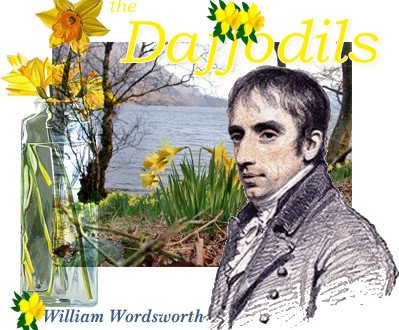William
Wordsworth
is often considered the godfather of English romantic poets. Older than the rest of the pack, he was born
on April 7, 1770 in Cockermouth, Cumberland. He was not dashing like John Keats
or heroic like Lord Byron. He was a writing partner, mentor,
and benefactor to Samuel Coleridge but did not share his enthusiasm
for the epic and esoteric. Instead, often enthused
about nature and the beautiful Lake District where he lived and tramped
on foot. This identification
with nature deeply influenced American Ralph Waldo Emerson who
visited him on his Grand Tour of Europe. He was raised to Poet Laureate of the
United Kingdom and served from 1843 until his death on April 23,
1850. He remains widely anthologized
and admired in Britain.
His star dimmed in the U.S. with changing tastes
and the almost complete abandonment of studying poetry as literature
in American schools. Interest has
somewhat revived with the ecological movement which sees him as a pioneering
voice.
Early
April is the perfect time for Wordsworth, not only for his birthday, but for his
nature verse, the best known of which is Daffodils.
Daffodils
I wandered
lonely as a cloud
That floats
on high o’er vales and hills,
When all at
once I saw a crowd,
A host, of
golden daffodils;
Beside the
lake, beneath the trees,
Fluttering
and dancing in the breeze.
Continuous
as the stars that shine
And twinkle
on the milky way,
They stretched
in never-ending line
Along the
margin of a bay:
Ten thousand
saw I at a glance,
Tossing
their heads in sprightly dance.
The waves
beside them danced; but they
Out-did the
sparkling waves in glee:
A poet could
not but be gay,
In such a jocund
company:
I gazed—and
gazed—but little thought
What wealth
the show to me had brought:
For oft,
when on my couch I lie
In vacant or
in pensive mood,
They flash
upon that inward eye
Which is the
bliss of solitude;
And then my
heart with pleasure fills,
And dances
with the daffodils
—William Wordsworth
Wordsworth setting off on one of his tramps from Dove Cottage in the English Lake District.
This poem plows that ground
as well but is a useful reminder to us now so concerned with the science
and technology of trying to save the Earth from eminent
destruction to literally take time to smell the flowers.
The Tables Turned
UP! up! my
Friend, and quit your books;
Or surely
you'll grow double:
Up! up! my
Friend, and clear your looks;
Why all this
toil and trouble?
The sun,
above the mountain's head,
A freshening
lustre mellow
Through all
the long green fields has spread,
His first
sweet evening yellow.
Books! ‘tis
a dull and endless strife:
Come, hear
the woodland linnet,
How sweet
his music! on my life,
There’s more
of wisdom in it.
And hark!
how blithe the throstle sings!
He, too, is
no mean preacher:
Come forth
into the light of things,
Let Nature
be your teacher.
She has a
world of ready wealth,
Our minds
and hearts to bless—
Spontaneous
wisdom breathed by health,
Truth
breathed by cheerfulness.
One impulse
from a vernal wood
May teach
you more of man,
Of moral
evil and of good,
Than all the
sages can.
Sweet is the
lore which Nature brings;
Our meddling
intellect
Mis-shapes
the beauteous forms of things:—
We murder to
dissect.
Enough of
Science and of Art;
Close up
those barren leaves;
Come forth,
and bring with you a heart
That watches
and receives.
—William
Wordsworth
An uncharacteristically dour portrait of William Wadsworth now remembered best for his sunny nature verse inspired by the English Lake District.
This late life verse puts
nature in the perspective of his own mortality.
I Have Thoughts that Are Fed by the Sun
I have
thoughts that are fed by the sun:
The things
which I see
Are welcome
to me,
Welcome
every one –
I do not
wish to lie
Dead, dead,
Dead,
without any company.
Here alone
on my bed
With
thoughts that are fed by the sun,
And hopes
that are welcome every one,
Happy am I.
Oh life
there is about thee
A deep
delicious peace;
I would not
be without thee,
Stay, oh
stay!
Yet be thou
ever as now –
Sweetness
and breath, with the quiet of death –
Be but thou
ever as now,
Peace,
peace, peace.
—William Wordsworth




No comments:
Post a Comment